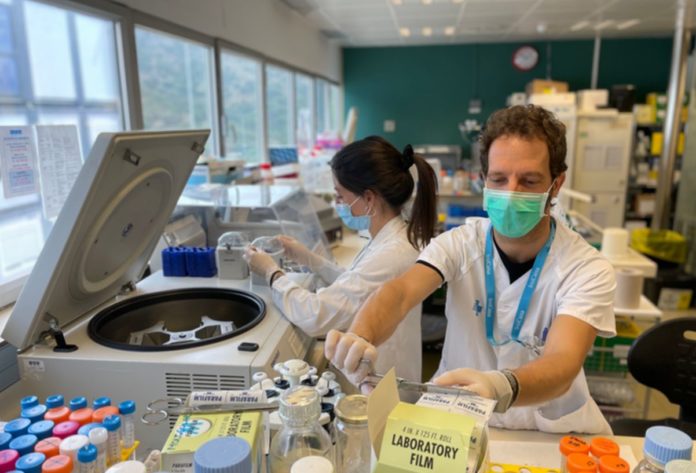Down syndrome is characterized by the presence of an extra chromosome. A newborn typically has 46 chromosomes. Down syndrome babies have an extra copy of one of these, the 21st chromosome.
According to the findings of a new study conducted by researchers at the Centre for Genomic Regulation (CRG) and the IrsiCaixa AIDS Research Institute, a center jointly promoted by the “la Caixa” Foundation and the Generalitat de Catalunya’s Department of Health, lamivudine, a commonly used antiretroviral drug for treating HIV, improves cognition in a mouse model of Down syndrome. Today, the study was published in the Journal of Cellular and Molecular Medicine.
The preliminary research shows the potential of using pharmacological interventions like lamivudine – or other drugs capable of blocking the same therapeutic target – as a treatment for reducing cognitive impairment in people with Down syndrome, even though clinical studies are required to confirm that the drug elicits a similar effect in humans.
Down syndrome is characterized by the presence of an extra chromosome. A newborn typically has 46 chromosomes. Down syndrome babies have an extra copy of one of these, the 21st chromosome.
Mild to moderate intellectual disability arises from this, which affects general cognitive abilities like memory, attention span, and speaking capacity. In addition to accelerated aging, persons with Down syndrome also endure cognitive deterioration that is more frequently observed in far older adults in the general population.
Alzheimer’s disease is also more likely to affect those with Down syndrome. This is because chromosome 21 carries the amyloid precursor protein (APP) gene, which produces amyloid proteins that accumulate in the brain and are related with altering brain function. Down syndrome is associated with amyloid buildup in most persons over the age of 40.
The majority of individuals with Down syndrome undertake psychosocial therapies, such as cognitive stimulation therapy, one of the few effective treatments, to facilitate independent functioning. However, there are currently no pharmaceutical treatments available. This research reveals that targeting retrotransposons is a novel, undiscovered treatment strategy for Down syndrome with significant therapeutic potential.
Retrotransposons are DNA segments that move across the genome by producing copies in RNA that re-enter the DNA at different locations. Retrotransposons are capable of inserting themselves into particular parts of the genome and, by chance, positioning themselves in gene-promoting regions associated with neurodegenerative disorders, thereby boosting their activity. Retrotransposition rates rise as people age and as cells age.
Retrotransposons, like HIV, replicate fast within cells, though not always with disastrous consequences. The study’s authors proposed that retrotransposons may be inhibited by using current inhibitors that now focus on the replication of HIV, such as the enzyme reverse transcriptase.
Dr. Bonaventura Clotet, Director of IrsiCaixa, says that the reverse transcriptase enzyme is required for the replication of both retrotransposons and HIV. “We know that lamivudine, a reverse transcriptase inhibitor used against HIV, was shown in aged mice to decrease the activation of retrotransposons which could be linked to age-associated disorders.”
“Therefore, we thought that it could be useful to counteract the cognitive impairment associated with Down syndrome,” he continues.
The researchers utilized Ts65Dn mice, the most extensively researched animal model of Down syndrome to date. Mice were given lamivudine treatment for four months, whereas a different control group received water. The researchers next conducted a number of behavioral procedures to measure anxiety, locomotor activity, and recognition memory.
They discovered that mice given lamivudine had better cognition. The study’s authors hypothesized that lamivudine’s effects on one or more APP gene variations may be responsible for the reported benefits of the drug.
According to Dr. Mara Dierssen, a researcher at the CRG and a co-author of the study, “our work aims to support people with Down syndrome and their families by providing them more options to live independent lives, particularly those affected by early-stage Alzheimer’s disease.”
“We still need pharmacological treatments that consistently help improve memory, attention and language functions, or prevent cognitive decline associated with ageing. This study is one step aiming to change that, revealing retrotransposition as an interesting mechanism to pursue not only in ageing but also in neurodevelopmental disorders,” says Dr. Dierssen.
Both the US and EU’s medical authorities have approved the prescription drug lamivudine for the treatment of HIV infection in both adults and children. The next step for the researchers is to start medication clinical studies for persons with Down syndrome and Alzheimer’s disease.
Image Credit: IrsiCaixa
You were reading: If You Struggle With Down Syndrome, Researchers Might Have A New Solution
